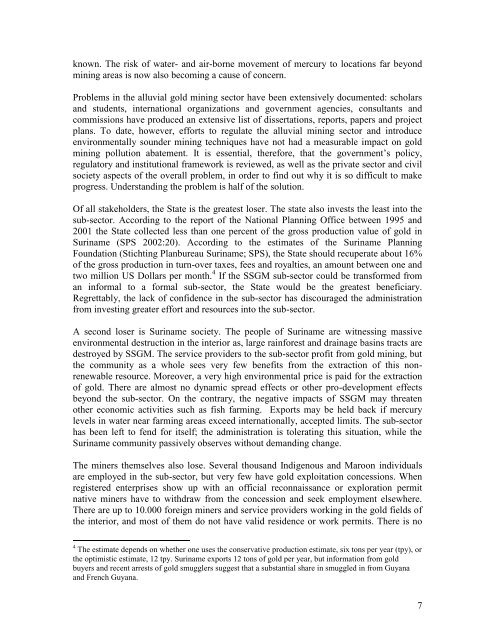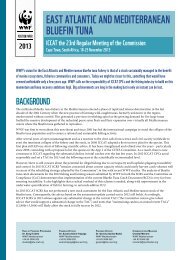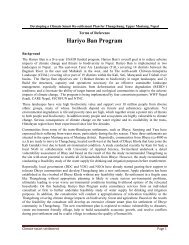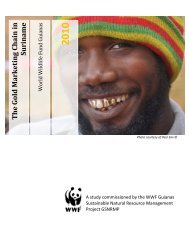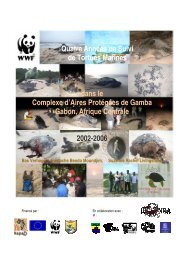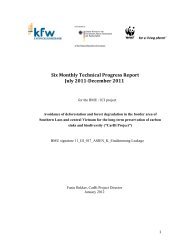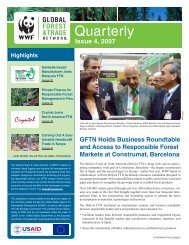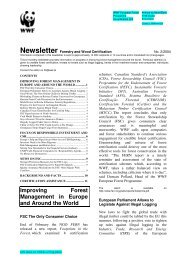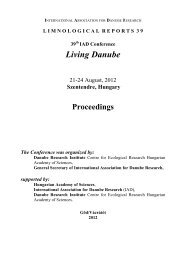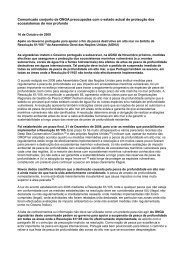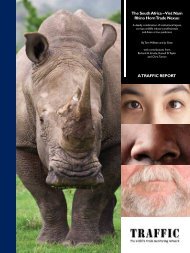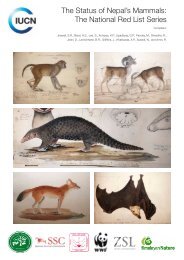SITUATION ANALYSIS OF THE SMALL-SCALE GOLD ... - WWF
SITUATION ANALYSIS OF THE SMALL-SCALE GOLD ... - WWF
SITUATION ANALYSIS OF THE SMALL-SCALE GOLD ... - WWF
You also want an ePaper? Increase the reach of your titles
YUMPU automatically turns print PDFs into web optimized ePapers that Google loves.
known. The risk of water- and air-borne movement of mercury to locations far beyond<br />
mining areas is now also becoming a cause of concern.<br />
Problems in the alluvial gold mining sector have been extensively documented: scholars<br />
and students, international organizations and government agencies, consultants and<br />
commissions have produced an extensive list of dissertations, reports, papers and project<br />
plans. To date, however, efforts to regulate the alluvial mining sector and introduce<br />
environmentally sounder mining techniques have not had a measurable impact on gold<br />
mining pollution abatement. It is essential, therefore, that the government‟s policy,<br />
regulatory and institutional framework is reviewed, as well as the private sector and civil<br />
society aspects of the overall problem, in order to find out why it is so difficult to make<br />
progress. Understanding the problem is half of the solution.<br />
Of all stakeholders, the State is the greatest loser. The state also invests the least into the<br />
sub-sector. According to the report of the National Planning Office between 1995 and<br />
2001 the State collected less than one percent of the gross production value of gold in<br />
Suriname (SPS 2002:20). According to the estimates of the Suriname Planning<br />
Foundation (Stichting Planbureau Suriname; SPS), the State should recuperate about 16%<br />
of the gross production in turn-over taxes, fees and royalties, an amount between one and<br />
two million US Dollars per month. 4 If the SSGM sub-sector could be transformed from<br />
an informal to a formal sub-sector, the State would be the greatest beneficiary.<br />
Regrettably, the lack of confidence in the sub-sector has discouraged the administration<br />
from investing greater effort and resources into the sub-sector.<br />
A second loser is Suriname society. The people of Suriname are witnessing massive<br />
environmental destruction in the interior as, large rainforest and drainage basins tracts are<br />
destroyed by SSGM. The service providers to the sub-sector profit from gold mining, but<br />
the community as a whole sees very few benefits from the extraction of this nonrenewable<br />
resource. Moreover, a very high environmental price is paid for the extraction<br />
of gold. There are almost no dynamic spread effects or other pro-development effects<br />
beyond the sub-sector. On the contrary, the negative impacts of SSGM may threaten<br />
other economic activities such as fish farming. Exports may be held back if mercury<br />
levels in water near farming areas exceed internationally, accepted limits. The sub-sector<br />
has been left to fend for itself; the administration is tolerating this situation, while the<br />
Suriname community passively observes without demanding change.<br />
The miners themselves also lose. Several thousand Indigenous and Maroon individuals<br />
are employed in the sub-sector, but very few have gold exploitation concessions. When<br />
registered enterprises show up with an official reconnaissance or exploration permit<br />
native miners have to withdraw from the concession and seek employment elsewhere.<br />
There are up to 10.000 foreign miners and service providers working in the gold fields of<br />
the interior, and most of them do not have valid residence or work permits. There is no<br />
4 The estimate depends on whether one uses the conservative production estimate, six tons per year (tpy), or<br />
the optimistic estimate, 12 tpy. Suriname exports 12 tons of gold per year, but information from gold<br />
buyers and recent arrests of gold smugglers suggest that a substantial share in smuggled in from Guyana<br />
and French Guyana.<br />
7


